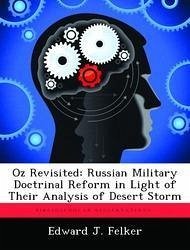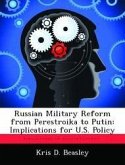Much occurred to influence Russian military doctrine from the Gulf War's end to the Russians issuing their draft doctrine in May 1992. The Gulf War was a significant military experience for the Russians because it highlighted what their General Staff thought was wrong with the military doctrine they inherited from the former Soviet Union. The Gulf War affected their perception of future war and how they should posture their forces for it. This thesis explores the evolution of Russian military doctrine in light of the lessons they say they learned from the Gulf War. Since the early 1980s, such prominent military thinkers as Marshal of the Soviet Union N. V. Ogarkov argued that emerging technologies were generating a new revolution in military affairs. The Russian military doctrinal response to Desert Storm seems to confirm Marshal Ogarkov's predictions. This thesis finds the new military doctrine (1) reverts from the defensive to an offensive preemption, (2) reverts from no nuclear first use to nuclear escalation, (3) guarantees ethnic Russians living in former Soviet states protection, (4) emphasizes the importance of military advancement in C4I, smart weapons, and mobility, and (5) emphasizes strategic nonnuclear deterrent forces. Having detailed the Russians' preoccupation with an outward look, the study concludes that the General Staff neglected to look inward at the contribution the former Soviet military made to the collapse of the Soviet Union and the Warsaw Pact. In forming their military doctrine, like the intrepid travelers to Oz, they seem to pay no attention to the "man behind the curtain." This thesis concludes the Russian Federation's draft military doctrine, in essence, lacks reality and creates a danger of Russian military policy moving divergently from political influence.








